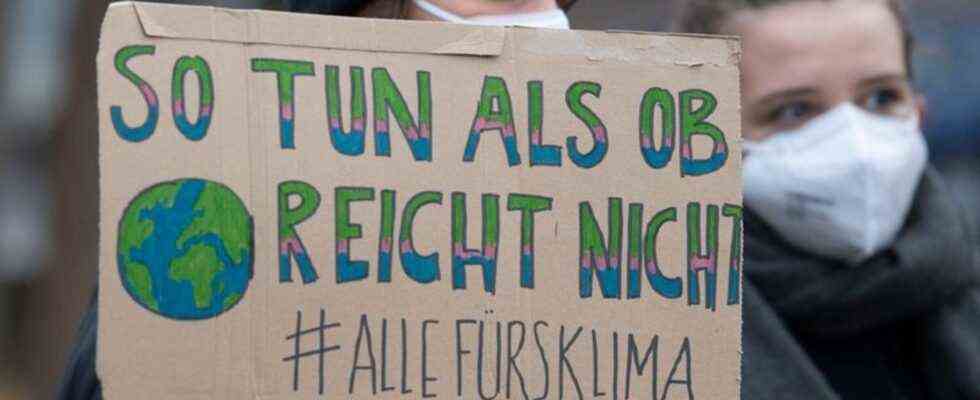opinion poll
Many young people do not want to do without climate protection
Participant in a demonstration by the climate protection movement “Fridays For Future” in Berlin. Photo: Paul Zinken / dpa
© dpa-infocom GmbH
Again and again, thousands of young people demonstrate for more climate protection. But according to a survey, many do not want to do without something in everyday life. But the boys are not alone in this.
Talking green, but not living so green? Despite climate protests, many young people do not want to do without their usual comfort. At least that’s what a survey suggests.
Accordingly, climate change worries many young people in Germany. However, the majority do not want to do without flying, eating meat and driving, for example.
“The habits and the desire for comfort are too great,” says youth researcher Klaus Hurrelmann. The mental breakthrough to a climate-conscious life is still pending in the younger generation.
“The idea that we older people have: that the younger generation is almost exclusively vegan and vegetarian and the car is no longer used” – yes, this group does exist, says Hurrelmann. “It was all the more surprising for me to see that she is a minority group and has not yet managed to get the majority on her side.”
Many do not want to do without a car or travel
In figures, the survey presented by youth researcher Simon Schnetzer on Monday shows it like this: With 56 percent, most 14 to 29-year-olds see climate change as the economic and social issue that worries them – even more than that Future of the pension system, rising prices or an impending split in society.
On the other hand: 27 percent say they are willing to consistently forego air travel – but 39 percent reject it. The remaining 34 percent ticked “maybe” without obligation. In fact, more than half of them say “no” if they permanently renounce their own car or animal products. This is most pronounced in the countryside, where there are also fewer alternatives, explained Schnetzer.
The older generation also finds it difficult to limit themselves for climate protection. In surveys, for example, many show that they are willing to forego short flights or car journeys. Until the beginning of the Corona crisis, that hadn’t changed much in reality, but also for the elderly.
“Fridays for Future” is a minority
When it comes to sorting waste, both young and old usually go along without any problems. But compromises in terms of food, vacation and traffic are more difficult to accept. Climate protection, yes, but with as few personal restrictions as possible.
“It is noticeable that those in the younger generation who advocate changes in lifestyle are very determined, very loud and also clearly perceived,” said Hurrelmann. He referred to the example of Fridays for Future. The international movement repeatedly brings tens of thousands onto the streets to demonstrate for more climate protection.
Everyday life apparently follows this very little. According to the survey, you don’t get on buses and trains more often than in your own car. Vegetarians and vegans are clearly in the minority even among young people. However, with a total of around 22 percent, the proportion is more than twice as high as in other surveys that show the total population – a sign that something may be moving after all.
Many “maybe” want to change their lifestyle. For Hurrelmann, this is the most exciting finding. “The willingness of the younger generation to change their lifestyle is latent.” But many still waited lazily. Those who still live at home are often unable to enforce which food is on the table, for example.
“Under these circumstances, climate protection, which is largely advocated by young people, can only succeed with clear rules and guidelines from politicians,” concluded Hurrelmann. “Now it needs encouragement.” It is important that this also comes from the elderly.

